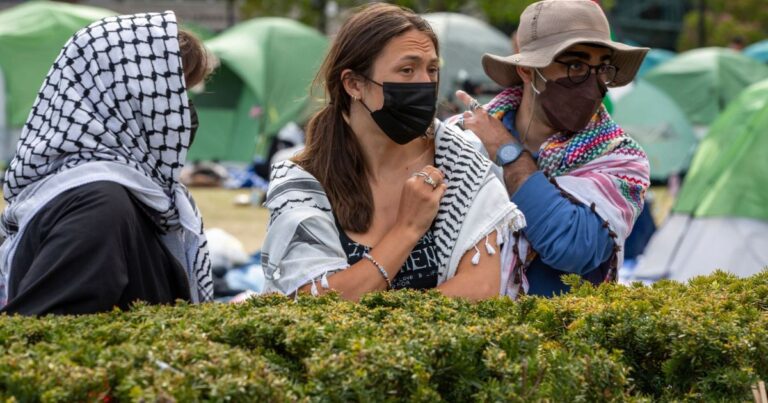Pro-Palestinian protests continue at universities across the United States and are also spreading to schools in Europe and Australia.
In the second week of protests calling for a ceasefire in Israel’s war on Gaza, which has killed more than 34,000 Palestinians, thousands of students are calling on dozens of universities to disengage from Israel.
Some universities were forced to cancel their graduation ceremonies, while others saw entire buildings occupied by protesting students.
One of the latest to join the movement is the City University of New York (CUNY), where hundreds of students set up an encampment on campus with banners with slogans like “No more investment in apartheid “.
Gabby Aossey, student organizer of the CUNY protest, told Al Jazeera that the mobilization of pro-Palestinian youth in the United States was “beautiful to see.”
“Young people are really starting to come forward and demand that schools be held accountable for their relationship with Israeli settlement,” Aossey said.
In the United States, university leaders have tried, unsuccessfully, to suppress demonstrations. Police intervened violently, with videos from different states showing hundreds of students – and even teachers – forcibly arrested.
At Columbia University, where more than 100 pro-Palestinian activists were arrested by armed police on campus about a week ago, university leaders said in a statement. statement On Friday, if the university called the New York Police Department again, it would “further inflame what is happening on campus.”
Some university leaders and state officials have strongly condemned the protests, calling them “anti-Semitic.”
The demonstrators reject this accusation and many Jewish activists and some Orthodox Jews join the ranks.
“As a child of Holocaust survivors, it deeply disturbs me to see my own people perpetrate something that we experienced,” Sam Koprak, a Jewish anti-war protester, told Al Jazeera during a gathering on campus.
“End complicity with genocide”
The protests, which have multiplied around the world in the seven months since the start of the war on Gaza, continue to spread this week also outside the United States.
In Berlin, activists staged a camp in front of Parliament to demand that the German government stop exporting weapons to Israel. At the famous Sciences Po university in the French capital Paris, protesters blocked a central campus building on Friday, forcing classes to take place online.
The last pro-Palestinian rally In Sweden on Saturday, people marched in the streets shouting “Free Palestine” and “Boycott Israel”.
Hundreds of people gathered in central London on Saturday afternoon in solidarity with Palestinians, with a small group organizing a pro-Israel event.
“People are gathering here in Parliament Square, right outside the Houses of Parliament, for the latest in a series of very significant protests in the heart of London,” said Al Jazeera’s Harry Fawcett, reporting from London .
Ben Jamal, director of the Palestine Solidarity Campaign, organizer of the march, said he expected hundreds of thousands of people to come from across the UK.
“Once again, we are delivering a double message. The first is a message of solidarity addressed to the Palestinian people. We see you, we hear you, we stand with you,” he said.
The second message, Jamal said, is for the British political establishment “to end its complicity with the Israeli genocide against the Palestinian people.”
Jamal rejected criticism that the protests were anti-Semitic.
“This tactic of confusing anti-Semitism with legitimate criticism of the State of Israel is very familiar and is used around the world by Israel to silence those who defend Palestinian rights,” he said .
Separately, Rina Shah, a Washington-based political strategist and former senior congressional aide, said the protests at U.S. universities are a demonstration of democracy in action, a welcome sight in an election year marked by concerns about voter apathy, mainly due to Israel’s war on Gaza. .
“So when I see a movement like this of students taking peaceful, nonviolent actions and expressing concern about the U.S. government’s support for Israel and where our tax dollars are going, I think it’s “It’s extremely healthy,” she told Al Jazeera.
“These students are concerned about America’s role in supporting (Israeli Prime Minister) Benjamin Netanyahu. On the one hand, we provide weapons and funds to do what he wants to do in Gaza, while on the other hand, we send humanitarian aid to Gaza. It’s the hypocrisy that worries these students.


